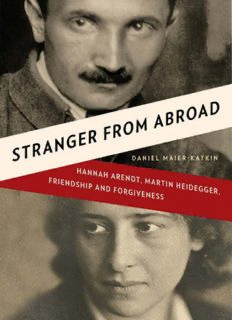
Stranger from abroad : Hannah Arendt, Martin Heidegger, friendship, and forgiveness PDF
Preview Stranger from abroad : Hannah Arendt, Martin Heidegger, friendship, and forgiveness
STRANGER ABROAD FROM STRANGER ABROAD FROM Hannah Arendt, Martin Heidegger, Friendship and Forgiveness D M -K ANIEL AIER ATKIN W. W. NORTON & COMPANY NEW YORK LONDON Copyright © 2010 by Daniel Maier-Katkin All rights reserved Since this page cannot legibly accommodate all the copyright notices, Credits constitute an extension of the copyright page. For information about permission to reproduce selections from this book, write to Permissions, W. W. Norton & Company, Inc., 500 Fifth Avenue, New York, NY 10110 Library of Congress Cataloging-in-Publication Data Maier-Katkin, Daniel, 1945– Stranger from abroad: Hannah Arendt, Martin Heidegger, friendship, and forgiveness / Daniel Maier-Katkin.—1st ed. p. cm. Includes bibliographical references. ISBN: 978-0-39307731-5 1. Arendt, Hannah, 1906–1975—Friends and associates. 2. Heidegger, Martin, 1889–1976—Friends and associates. I. Title. B945.A694M35 2010 320.5092—dc22 [B] 2009043992 W. W. Norton & Company, Inc. 500 Fifth Avenue, New York, N.Y. 10110 www.wwnorton.com W. W. Norton & Company Ltd. Castle House, 75/76 Wells Street, London W1T 3QT To the memory of my parents, who brought me into one world, and to Birgit, who showed me another Contents ACKNOWLEDGMENTS Chapter 1 Chapter 2 Chapter 3 Chapter 4 Chapter 5 Chapter 6 Chapter 7 Chapter 8 Chapter 9 Chapter 10 Chapter 11 Chapter 12 Chapter 13 Chapter 14 Chapter 15 Chapter 16 Chapter 17 Chapter 18 Chapter 19 Chapter 20 Chapter 21 Chapter 22 Chapter 23 Chapter 24 Chapter 25 Chapter 26 Chapter 27 Chapter 28 Chapter 29 Chapter 30 Chapter 31 Chapter 32 Chapter 33 Chapter 34 Chapter 35 Chapter 36 Notes CREDITS ACKNOWLEDGMENTS I am grateful to my children, Andrew, Rebecca, Rosalia and Hannah, for their support and encouragement during long years when I must have seemed too often preoccupied with Hannah Arendt. Rebecca was among the most thorough and thoughtful of my readers and Hannah was always happy to discuss whatever I was working on, especially on our long morning drives to the Magnolia School. Other readers for whose helpful suggestions I am grateful include Maria Foscarinis, Nathan Stoltzfus, Elliott Currie, Bill Cloonan, Neil Jumonville, Martin Kavka, Karl Sabbagh, Mary Delina Wright, Peter Fleming, John Davis, Edward Katkin, Sylvia Katkin, and Caryn Pally. Sumner Twiss, my colleague at the Center for the Advancement of Human Rights, has been invaluable as a source of ideas and references. Conversations with Jerome Kohn, when I was just beginning to think that the story of Hannah Arendt and Martin Heidegger had never been properly told, helped to shape my thinking. I am indebted to Bert Lockwood, editor of Human Rights Quarterly, and Christina Thompson, editor of the Harvard Review, who both saw the value of this project early on; without their decisions to publish early versions of the story the book might never have come to fruition. Dan O’Connell also saw the value of the project early on. His support and advice were immensely helpful to me. My tough, challenging, and gifted editor, Alane Mason, taught me how to turn a story into a book and never stopped demanding additional detail, clearer thinking, and better, more precise, and more elegant use of language. I should add too how impressed I have been by the kindness and competence of the people who work with her at W. W. Norton. I also want to acknowledge several friends, Bruce and Lisa Bullington, Ray and Nonnie Fleming, Frank Kron, Alex Wender, Teddy Tollet, Diop Kamau, and Lorenz Böllinger, from whom I have learned a great deal over many years about people and the diversity of cultures. Their influence on my way of thinking about human relationships is reflected between the lines and in the fundamental conception of the story I have tried to tell. Then there is Birgit, my beloved life companion and guide to all things European and to scholarship in the humanities. Without Birgit there would never have been the germ of the idea that has culminated in Stranger from Abroad nor the will or skill to write it. Much of what has been written in the past about the relationship between Arendt and Heidegger is the work of their detractors. Arendt was judgmental and controversial, and her youthful love affair and subsequent reconciliation with Heidegger have been used to throw some of her critical judgments into doubt. I have tried to tell their story differently, more accurately and with greater sensitivity to the complexity of their thinking and feelings. If I have not succeeded, the responsibility, despite all the help I have acknowledged here, is mine alone. STRANGER ABROAD FROM
Description: